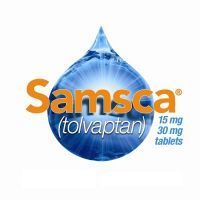FDA Limits Usage, Duration of Hyponatremia Drug Due to Observed Liver Damage Risk
Citing an increased risk of liver injury observed in recent clinical trials, the US Food and Drug Administration (FDA) has limited Samsca (tolvaptan) treatment to 30 days and recommended the oral selective vasopressin V2-receptor antagonist be discontinued in patients with signs of liver disease or symptoms of liver injury.

Citing an increased risk of liver injury observed in recent clinical trials, the US Food and Drug Administration (FDA) has limited Samsca (tolvaptan) treatment to 30 days and recommended the oral selective vasopressin V2-receptor antagonist be discontinued in patients with signs of liver disease or symptoms of liver injury.
Manufactured by Otsuka American Pharmaceutical, Inc., Samsca was approved by the FDA in May 2009 toraise serum sodium levels in non-urgent patients with clinically significant hypervolemic and euvolemic hyponatremia, including those with congestive heart failure, liver cirrhosis and the syndrome of inappropriate antidiuretic hormone (SIADH).
But after three serious liver injury cases attributed to tolvaptan were observed in autosomal dominant polycystic kidney disease (ADPKD) patientsina three-year, placebo-controlled clinical trial published in the December 2012 issue of the New England Journal of Medicine, the FDA removed Samsca’s indication for liver cirrhosis and urged patients with underlying liver disease — including cirrhosis —to avoid the once-daily treatment “because it can cause liver injury, potentially requiring liver transplant or death.”
Otsuka issued a letter to health care providers in January informing them of that potential risk in patients receiving Samsca.
“Healthcare providers should perform liver tests promptly in patients who report symptoms that may indicate liver injury, including fatigue, anorexia, right upper abdominal discomfort, dark urine, or jaundice. If hepatic injury is suspected, Samsca should be promptly discontinued, appropriate treatment should be instituted, and investigations should be performed to determine probable cause,” the pharmaceutical company wrote in the letter. “Samsca should not be re-initiated in patients unless the cause for the observed liver injury is definitively established to be unrelated to treatment with Samsca.”
The FDA said the drug’s label has been updated to include the new usage and duration limits, and the agency noted it is “reviewing the information from clinical trials of patients with ADPKD and will update the public on the risk of liver injury with Samsca if more information becomes available.”